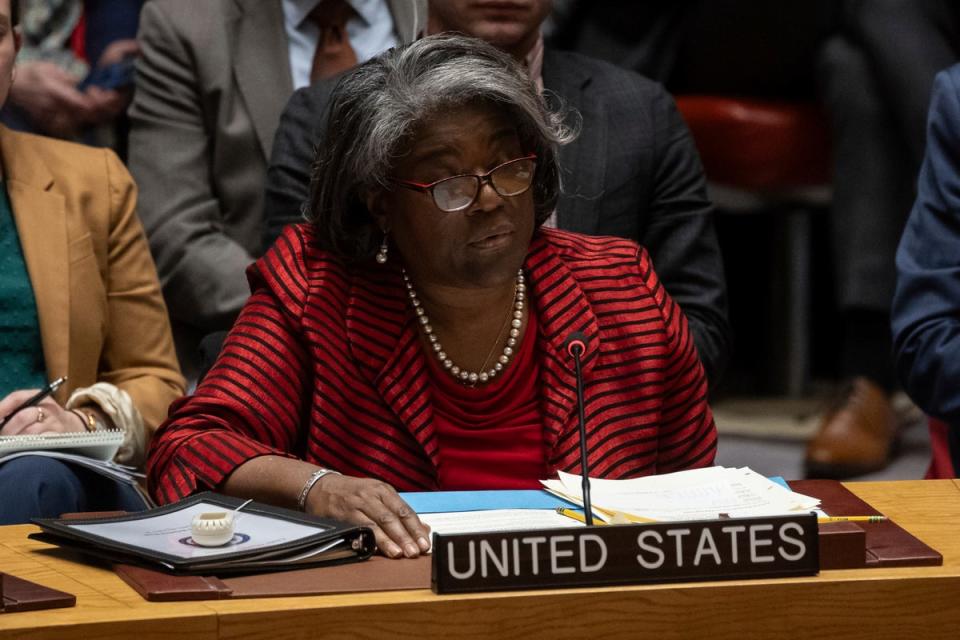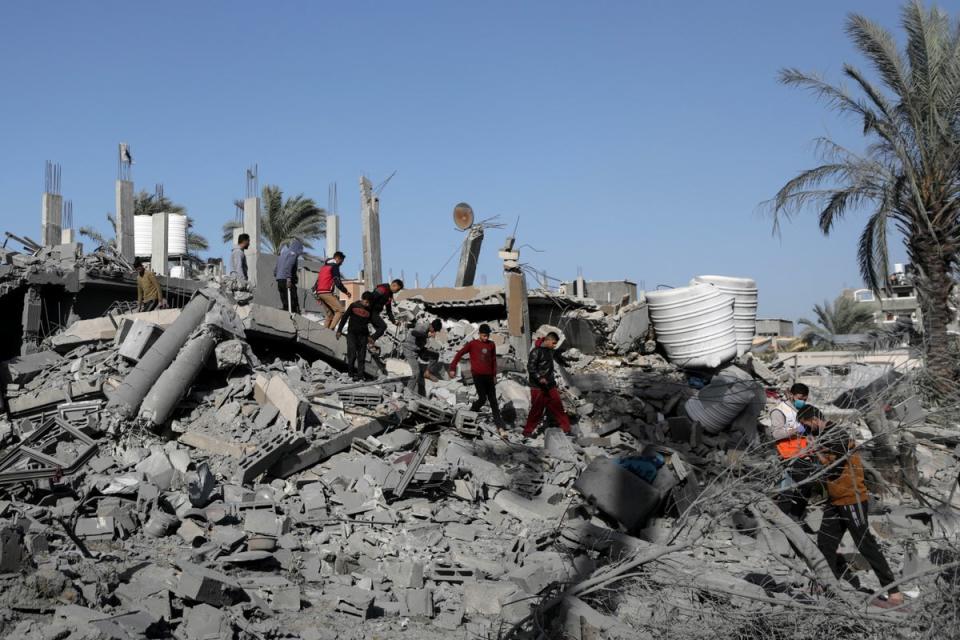UN Security Council approves resolution for aid to Gaza but stops short of call for ceasefire
The United Nations Security Council has approved a resolution pressing for the urgently needed passage of humanitarian aid into Gaza after 11 weeks of Israel’s devastating siege of the beleaguered strip.
But after several days of negotiations led by the United States, the council stopped short of a resolution calling for an immediate cessation of violence, instead approving a watered-down measure in an effort to avoid a veto from the US.
The long-delayed vote in the 15-member council was 13-0 – the US and Russia ultimately abstained from voting.
The resolution was stripped of its call for “the urgent suspension of hostilities to allow safe and unhindered humanitarian access, and for urgent steps towards a sustainable cessation of hostilities”. Instead, it calls “for urgent steps to immediately allow safe and unhindered humanitarian access, and also for creating the conditions for a sustainable cessation of hostilities”.
A final version did not include demands for a ceasefire or any immediate pause in the fighting, making it unlikely that the measure to support the flow of aid into Gaza – which is largely in Israel’s control – will initiate any end to violence that has left thousands dead.
Within 10 weeks, Israel’s air-and-ground assault in Gaza has now killed more than 20,000 people, a figure that amounts to nearly 1 per cent of the population before Israel’s war against Hamas.
Israel launched its devastating retaliatory campaign following Hamas attacks in Israel on 7 October that left 1,200 people dead and took roughly 240 hostages. Israel’s response has killed roughly one in every 100 people in Gaza. More than two-thirds are women and children.
The “purpose” of the draft resolution introduced by the United Arab Emirates “is very simple”, said ambassador Lana Nusseibeh told the council in New York on Friday.
It “responds with action to the dire conditions in Gaza while protecting those who are trying to deliver aid”, she said.
“We know this is not a perfect text, we know only a ceasefire will stop the suffering,” she added.
Riyad Mansour, the Palestinian UN envoy, said it took the Security Council 75 days “to finally utter the words ‘cessation of hostilities,’” stressing that the Palestinians and Arab nations supported the Russian amendment. “This resolution is a step in the right direction” because of its important humanitarian provisions, Mansour said. “It must be implemented and must be accompanied by massive pressure for an immediate ceasefire.”
The US had twice vetoed resolutions supporting a ceasefire, magnifying the gulf between the US and global powers and Arab nations, while President Joe Biden’s administration refused or moderated any pressure on Israel and prime minister Benjamin Netanyahu to limit the destruction.
Passage of the latest resolution on Friday followed another week of delays, marked by intense negotiations involving UN secretary general Antonio Guterres in an effort to finally broker passage of a measure with US support.
The resolution does not call on Israel to relinquish its control over the inspections of aid into Gaza, though it calls for the appointment of a “coordinator” to oversee its entry.
That person will be responsible for “facilitating, coordinating, monitoring and verifying” humanitarian aid in Gaza by “consulting all relevant parties”.

American and Israeli officials have insisted that any pause in the fighting will simply aid Hamas militants in their efforts to regroup.
A measure blocked on Tuesday would have called for a legally binding “urgent suspension of hostilities to allow safe and unhindered humanitarian access and for urgent steps [to be taken] towards a sustainable cessation of hostilities”.
Vasily Nebenzya, Russia’s UN ambassador, called US negotiations “shameful, cynical and irresponsible conduct” as a means to “sabotage” efforts towards a lasting peace with an ultimately “toothless” and “extremely neutered” resolution.
He criticised the “ambiguous phrase” that calls for a “for a sustainable cessation of hostilities” and said that any obstruction of immediate attempts to end the conflict make council members “complicit” in Gaza’s destruction, suggesting that the measure is “giving Israel a green light for war crimes”.
“Why are we together in this room? To rubber stamp a decision that is convenient for Washington?” he added.

Following the vote, US Ambassador Linda Thomas-Greenfield said the resolution’s passage – which she abstained from supporting – “provided a glimmer of hope amongst a sea of unimaginable suffering”.
She said that the US will “continue to work with the UN, with humanitarian groups and countries in the region to get more humanitarian aid into Gaza to secure the release of hostages and to work towards a lasting peace”.
“We must find a path forward to in the misery we’re seeing,” she added. “We must work together to alleviate this tremendous suffering once and for all.”
The US vetoed a Security Council resolution on 18 October to condemn all violence against civilians in the Israel-Hamas war and to urge humanitarian aid to Palestinians in Gaza. On 8 December the US vetoed a second council resolution backed by almost all other council members and dozens of other nations, demanding an immediate humanitarian ceasefire in Gaza. The 193-member General Assembly overwhelmingly approved a similar resolution on 12 December by a vote of 153-10, with 23 abstentions.
Additional reporting by John Bowden in Washington DC

 Yahoo News
Yahoo News 
